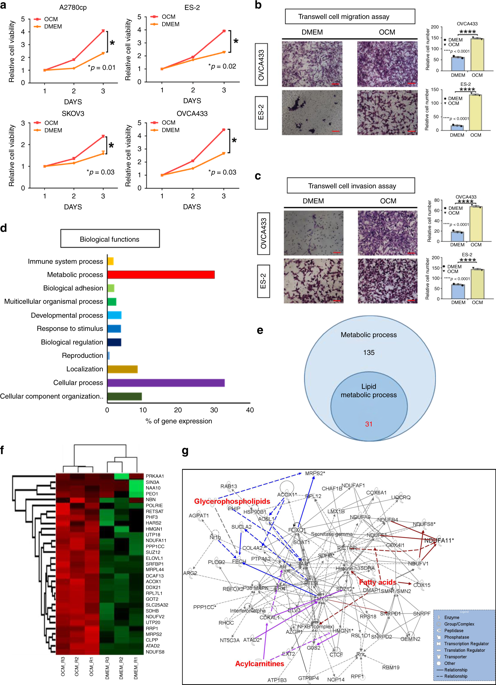当前位置:
X-MOL 学术
›
Commun. Biol.
›
论文详情
Our official English website, www.x-mol.net, welcomes your
feedback! (Note: you will need to create a separate account there.)
Targeting of lipid metabolism with a metabolic inhibitor cocktail eradicates peritoneal metastases in ovarian cancer cells.
Communications Biology ( IF 5.2 ) Pub Date : 2019-07-31 , DOI: 10.1038/s42003-019-0508-1 Rain R Chen 1, 2 , Mingo M H Yung 1, 2 , Yang Xuan 1 , Shijie Zhan 1 , Leanne L Leung 1, 2 , Rachel R Liang 1, 2 , Thomas H Y Leung 2 , Huijuan Yang 3 , Dakang Xu 4 , Rakesh Sharma 5 , Karen K L Chan 2 , Siew-Fei Ngu 2 , Hextan Y S Ngan 1, 2 , David W Chan 1, 2
Communications Biology ( IF 5.2 ) Pub Date : 2019-07-31 , DOI: 10.1038/s42003-019-0508-1 Rain R Chen 1, 2 , Mingo M H Yung 1, 2 , Yang Xuan 1 , Shijie Zhan 1 , Leanne L Leung 1, 2 , Rachel R Liang 1, 2 , Thomas H Y Leung 2 , Huijuan Yang 3 , Dakang Xu 4 , Rakesh Sharma 5 , Karen K L Chan 2 , Siew-Fei Ngu 2 , Hextan Y S Ngan 1, 2 , David W Chan 1, 2
Affiliation

|
Ovarian cancer is an intra-abdominal tumor in which the presence of ascites facilitates metastatic dissemination, and associated with poor prognosis. However, the significance of metabolic alterations in ovarian cancer cells in the ascites microenvironment remains unclear. Here we show ovarian cancer cells exhibited increased aggressiveness in ascites microenvironment via reprogramming of lipid metabolism. High lipid metabolic activities are found in ovarian cancer cells when cultured in the ascites microenvironment, indicating a metabolic shift from aerobic glycolysis to β-oxidation and lipogenesis. The reduced AMP-activated protein kinase (AMPK) activity due to the feedback effect of high energy production led to the activation of its downstream signaling, which in turn, enhanced the cancer growth. The combined treatment of low toxic AMPK activators, the transforming growth factor beta-activated kinase 1 (TAK1) and fatty acid synthase (FASN) inhibitors synergistically impair oncogenic augmentation of ovarian cancer. Collectively, targeting lipid metabolism signaling axis impede ovarian cancer peritoneal metastases.
中文翻译:

用代谢抑制剂混合物靶向脂质代谢可根除卵巢癌细胞的腹膜转移。
卵巢癌是一种腹腔内肿瘤,腹水的存在促进转移扩散,并与不良预后相关。然而,腹水微环境中卵巢癌细胞代谢改变的意义仍不清楚。在这里,我们发现卵巢癌细胞通过脂质代谢的重编程在腹水微环境中表现出更强的侵袭性。当在腹水微环境中培养时,卵巢癌细胞具有高脂质代谢活性,表明代谢从有氧糖酵解转向β-氧化和脂肪生成。由于高能量产生的反馈效应导致 AMP 激活蛋白激酶 (AMPK) 活性降低,导致其下游信号传导激活,进而促进癌症生长。低毒 AMPK 激活剂、转化生长因子 β 激活激酶 1 (TAK1) 和脂肪酸合酶 (FASN) 抑制剂的联合治疗可协同削弱卵巢癌的致癌作用。总的来说,靶向脂质代谢信号轴可阻止卵巢癌腹膜转移。
更新日期:2019-07-31
中文翻译:

用代谢抑制剂混合物靶向脂质代谢可根除卵巢癌细胞的腹膜转移。
卵巢癌是一种腹腔内肿瘤,腹水的存在促进转移扩散,并与不良预后相关。然而,腹水微环境中卵巢癌细胞代谢改变的意义仍不清楚。在这里,我们发现卵巢癌细胞通过脂质代谢的重编程在腹水微环境中表现出更强的侵袭性。当在腹水微环境中培养时,卵巢癌细胞具有高脂质代谢活性,表明代谢从有氧糖酵解转向β-氧化和脂肪生成。由于高能量产生的反馈效应导致 AMP 激活蛋白激酶 (AMPK) 活性降低,导致其下游信号传导激活,进而促进癌症生长。低毒 AMPK 激活剂、转化生长因子 β 激活激酶 1 (TAK1) 和脂肪酸合酶 (FASN) 抑制剂的联合治疗可协同削弱卵巢癌的致癌作用。总的来说,靶向脂质代谢信号轴可阻止卵巢癌腹膜转移。































 京公网安备 11010802027423号
京公网安备 11010802027423号